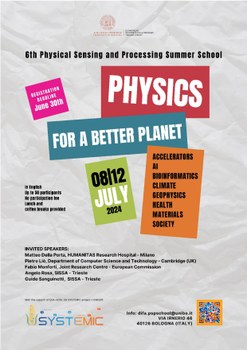6th edition: 8-12 July 2024

Physics for a Better Planet
SUMMER SCHOOL on PHYSICAL SENSING & PROCESSING – VI EDITION
- Science and scientific progress can help us to create a better world
The summer school showed examples from cutting-edge physics research in material science, health, geophysics, society, and climate. The purpose was to show how different areas of physics can contribute to building a better planet. Hands-on workshops have helped students practice with the topics presented.
The school was aimed at master's degree and PhD students.
Organization
Organized by Department of Physics & Astronomy – University of Bologna & Open Physics Hub
Director: Daniel Remondini
Co-director: Nico Curti, Alessandra Merlotti, Francesco Durazzi
LOC: Aldo Gardini, Claudia Testa, Mattia Ricchi, Mauro Villa, Marco Lenci, Maria Clelia Righi, Luca De Siena, Carlo Cintolesi, Mattia Ricchi, Roberto Spighi, Martina Tarozzi, Federico Magnani, Paolo Restuccia
PARTNERS
HUMANITAS Research Hospital (Milano)
SISSA (Trieste)
Joint Research Centre (European Commission)
Department of Computer Science and Technology (Cambridge)
The Schools is partially funded by:
- The European SYSTEMIC Project:
ERA-HDHL (Healthy Diet for Heathy Life) An integrated approach to the challenge of sustainable food systems: adaptive and mitigatory strategies to address climate change and malnutrition (SYSTEMIC) n. 696295
Main lectures
Matteo Della Porta (HUMANITAS Research Hospital - Milano) - Applications of generative AI in Personalized Medicine
Guido Sanguinetti (SISSA - Trieste) - Machine learning methods for single-cell transcriptomic data
Angelo Rosa (SISSA - Trieste) - Polymer physics of the genome
Pietro Liò (Department of Computer Science and Technology - Cambridge) - Diffusion and geometric models for medicine
Fabio Monforti (Joint Research Centre - European Commission) - From Science to Policy. Some experiences from the European Commission's Joint Research Centre
Seminars
Aldo Gardini (Department of Statistical Sciences - UNIBO) - Statistics in the AI era: Obsolete discipline or essential tool?
Claudia Testa (Department of Physics and Astronomy - UNIBO) - Water motion to map brain connectivity
Francesco Durazzi (Department of Physics and Astronomy - UNIBO) - Human digital traces: mobility and social media
Maria Clelia Righi (Department of Physics and Astronomy - UNIBO) - Materials Modelling and Design: H2 production and Tribology as case studies
Roberto Spighi (INFN- UNIBO) - Treating tumors with particle beams: status and perspectives
Marco Lenci (Department of Physics and Astronomy - UNIBO) - A scientific mindset is good for the world, and for science
Martina Tarozzi & Federico Magnani (Departmento of Medical and Surgical Sciences - UNIBO) - Leveraging neural networks to model pharmacology: the example of CAR-T therapies
Luca De Siena (Department of Physics and Astronomy - UNIBO) - Understanding Earth's past, present, and future using geophysical data
Carlo Cintolesi (Department of Physics and Astronomy - UNIBO) - Dispersion of pollutants in cities: a high-resolved modelling approach
Hands-on / Laboratory sessions
Mattia Ricchi (Department of Computer Science - University of Pisa) - Laboratory for brain connectomics
Nico Curti (Department of Physics and Astronomy - UNIBO) - I Will Survive (or Not?): Our World in Data
Riccardo Ridolfi (Department of Physics and Astronomy - UNIBO) - Call of Duty against tumors
Paolo Restuccia (Department of Physics and Astronomy - UNIBO) - Simulating materials functioning by molecular dynamics
Carlo Cintolesi (Department of Physics and Astronomy - UNIBO) - Is solar radiation a lever or a barrier for the dispersion of pollutants in an urban canyon? An investigation using fluid dynamics computational
Luca De Siena (Department of Physics and Astronomy - UNIBO) - The Geophysical Model Generator: 4D imaging of Earth’s structure and dynamics with Julia and Paraview
ATTACHMENTS
Gallery


Photo gallery of the event














